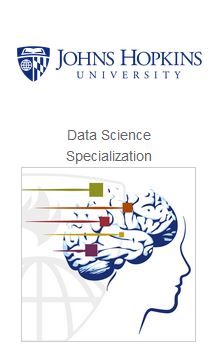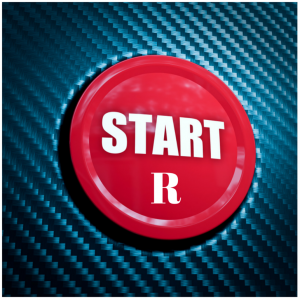You’ve got R and R Studio installed–now what? If you are more of a book-learner, I’ll give you some places to start in the next post, but we’ll start with the MOOC space. There is a lot of new content coming all the time; so all I can give you is a snapshot as of February of 2015, but I’ll provide updates occasionally.
Coursera Data Science Track
Put together by three professors from the Johns Hopkins University Bioinformatics program, the Data Science Specialization from Coursera is nine 4-week courses on R and Data Science. As of this writing, I’ve taken R Programming, Getting and Cleaning Data, Statistical Inference, and Practical Machine Learning.
Pros:
- Consistent use of R. You will become pretty proficient with R just by taking a few of these courses.
- Nice combination of video lectures, quizzes, and practical projects.
- Popular courses with active discussion groups during class offerings.
Cons:
- Coverage of topics like statistical inference and machine learning not in-depth enough to be called anything other than surveys.
- Some of the content and assignments appear to have been rushed and not well edited.
- The profs don’t interact on the discussion boards.
Machine Learning by Andrew Ng
Machine Learning by Stanford’s Andrew Ng was one of the earliest and most popular courses on machine learning. This course goes into enough depth for you to not just use machine learning as a black box, but to understand how and why it works. That level of understanding comes with a caveat: you’ll need to remember a bit of your college calculus and linear algebra (although Ng provides an optional section on the linear algebra you’ll need).
Statistical Learning
Statistical Learning with Trevor Hastie and Robert Tibshirani is new and in it’s first session. I started the course, but haven’t been able to make the time to keep up with it. However, I think this may be the best course to start with for several reasons:
- It follows the professors’ excellent text Introduction to Statistical Learning with Applications in R.
- The lectures are well-produced, featuring a nice combination of seeing the professors and the supporting graphics.
- Much more in-depth on machine learning than the Data Science Specialization.
Udacity offers some machine courses that look pretty good, but to access the course materials and exercises (which is necessary to really learn), you must use the paid version which is pretty expensive. Also check out Pedro Domingo’s Machine Learning course.



